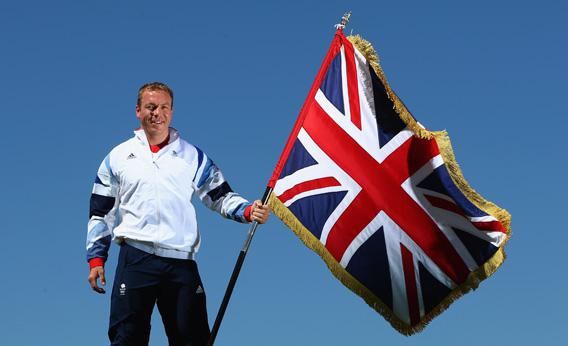As Friday’s opening ceremony approaches, Britons seem awfully gloomy about hosting the Olympic Games. True, preparations haven’t exactly gone smoothly. Troops were called in to beef up security after the company hired to protect the Olympic facilities failed to recruit enough guards. The London Organizing Committee has been accused of bullying small-fry butchers and bakers to protect deep-pocketed sponsors. Train drivers and airport immigration workers have also threatened to strike, putting additional strain on an already overstretched transportation system. To make matters worse, the weather has been horrid, even by British standards: The weeks from April to June were the rainiest quarter on record.
London Mayor Boris Johnson tried to buck up his compatriots, telling the “whingers” to “put a sock in it, fast.” Fat chance, BoJo. Britons enjoy complaining more than they like winning.
Pessimism is as ingrained in the British character as a craving for steak and kidney pie. Over the centuries, an admirable tendency toward modesty has morphed into an expression of self-hatred. It’s as if Britons believe they can inoculate themselves against disapproval by bad-mouthing themselves earlier and more viciously than any outsider would dream of. This tendency is magnified when it comes to sport. Years of disappointment in high-stakes, high-visibility events like Wimbledon and the World Cup have given the nation a bad case of sporting stage fright.
It’s a terrible shame, because the Brits do the games better than anyone else. I can’t speak to their hosting skills—I wasn’t around in 1948—but I know first-hand that supporting Team GB provides the ideal Olympic experience.
It’s not that I’m a U.K. homer. Although I was born and grew up in Britain, I was always a traitor in training. The closest I’ve ever come to being ejected from a sporting event was at the 1978 Wightman Cup, when I was one of the few spectators in the Royal Albert Hall cheering against the plucky British women tennis players as they vanquished the highly favored U.S. team. Now that I’m a U.S. citizen, I’m a patriot with the zeal only converts can feel. But when the Olympic flag is flying, I usually yell, “Come on my son”—the traditional British cheer applied to men, women, horses, and greyhounds—for Team GB.
The Olympics have very little in common with annual sporting championships like the World Series or the Super Bowl. Since the Summer Games occur just once every four years, they’re more like Christmas: a day—or in this case, a fortnight—when normalcy is suspended. Like Christmas, if you didn’t celebrate it as a child, the Olympics will always be something other people make a big fuss about but that leaves you cold. But if you happened to spend a few childhood summers glued to TV coverage of the Olympics, as I did, the games are more magical than any holiday.
My earliest memories are split between Santa and the Summer Games. In 1968, after 19-year-old Lillian Board took silver in the 400 meters in Mexico City, I spent hours in the elementary school playground pretending to be her. (Her biography was one of the first books that made me cry: Board died of colorectal cancer just two years after winning her medal.) Although I do recall the unfolding tragedy of the murdered Israeli athletes during the 1972 Munich Games, I have an even clearer picture of Belfast’s Mary Peters winning gold in the pentathlon, and David Wilkie, a Scotsman whose accent was amusingly Americanized by a stint at the University of Miami, taking silver in the 200-meter breaststroke.
From a TV spectator’s point of view, the ideal Olympic Ineptitude Quotient is halfway between Eric the Eel futility and Dream Team domination. Team GB typically exhibits perfect mediocrity. If your country won a total of just 13 medals, as Great Britain did in the 1976 Montreal Games, you’d pay attention to every rag-tag contest that ended with one of your compatriots on the podium. Some of those events might be familiar—the Montreal 13 included a couple of swimming medals and a bronze from the track—but since the BBC focused on competitions in which Team GB did well, I remember learning far more about Tornado- and Flying Dutchman-class sailboats than any normal teenager should ever know. I cheered on rowers, judokas, and pursuit cyclists. I also spent five days watching the British modern pentathlon team show-jump, fence, shoot, swim, and run cross-country while pursued by a pack of foreigners. (It was in his fencing bout with our team captain, Jim Fox, that the USSR’s Boris Onishchenko was revealed to have rigged a device that allowed him to score a point whenever he fancied.)
I’m not going to claim that the Americans are doing it wrong by doing so well. (In 1976, when the Brits scraped together that baker’s dozen of medals, the U.S. team won 13 golds in the swimming pool alone.) But when wins come too easily, the further I am away from the idealized Olympics of my childhood. In fact, the Brits are almost too good for me these days: At the 2008 Olympics in Beijing, Team GB notched their best performance in a century, landing fourth on the medal table.
My solution is to head north. On Friday, I’m leaving this land of plentiful gold to watch the games on Canadian television. I used to tell myself that I was fleeing America because I hated NBC’s Olympic coverage, but then I found myself spending as much time with Mary Carillo and Bob Costas as with their Canadian counterparts. I came to realize that what I miss is TV homerism for athletes in obscure sports. Next week I’ll be yelling, “Come on my son” to Canadian kayakers, wrestlers, and triathletes. And I’ll be hoping that the Brits do well—or that they at least get to enjoy a good grumble.
Read the rest of Slate’s coverage of the London Olympics.
